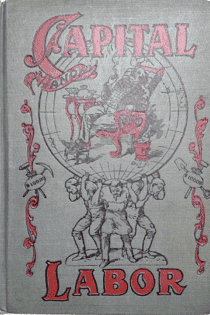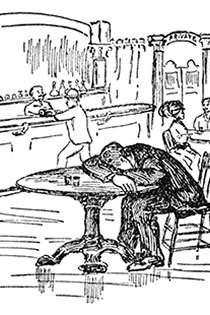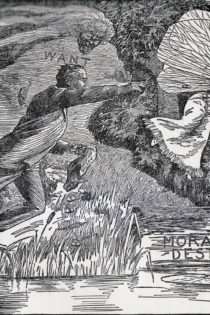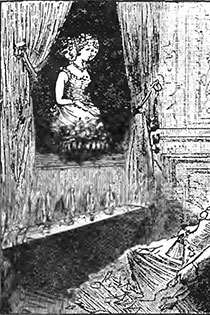The Reverend W.S. Harris lays out the case for Christian Socialism in 1907’s Capital and Labor.

After being preached and worshipped for almost twenty centuries, the most misinterpreted character in the world to-day is Jesus Christ. He was born in an obscure corner of the earth, yet a guiding star and heavenly choirs honored His birth. Christ was reared in holiness, and in the fullness of time His great forerunner, John the Baptist, proclaimed His coming. Suddenly He appeared and blazed forth with a new light and life, and made such a mighty impression that all human time was numbered anew from His birth. He taught for all ages, and it will require all the ages to show His completeness. By some He is worshipped as a religious teacher only; by others He is looked upon as the world’s Redeemer, a personal Savior, as a “friend that sticketh closer than a brother;” and still by others as a guiding star to the world’s peace, — not only religious but civil and industrial peace as well.
Will the dream of human brotherhood ever be realized upon earth? This is a practical question, and is waiting for an answer in the world and the church of to-day.
The idea of pure Socialism is a divine thought born of Heaven, and is to be realized upon earth. Its earliest light was seen when Christ spake to the multitudes, and to His immediate followers. They understood in part what He said, but a more complete interpretation of His life and teachings was left to unborn generations. The early church, trying to follow the teaching of Jesus, first lived in a state of approximate Communism, which is a partial interpretation of “Communion of Saints.” “We have but little light on this early type of Co-operation. It appears to have been soon overwhelmed with the selfishness of the age, even before human society had a chance to try or test the early Christian Socialism. The sad growth of competition, and the thorny vines of human greed soon over-ran the fair garden of promise until the life of the Heavenly plant was choked out by these noxious weeds. Thus was the second Eden lost, and those who were to occupy it, were thrown out upon the wild waste of a barren Social life, and ever since that time, the church and the world have been mutually suffering under the grinding processes of hard labor, and as a result, the rich are growing richer and the poor poorer.
Will the dream of human brotherhood ever be realized upon earth? This is a practical question, and is waiting for an answer in the world and the church of to-day. One of the strangest aspects of the Twentieth Century will be the rallying from the ranks of the church and the world under the banners of Christian Socialism, and this will bring to the earth the greatest industrial peace, rest and contentment that has ever been known.
Let us draw back the curtain of ages and look carefully at that marvelous light and then ask: “What are the principles of the perfect Social State as taught by Christ, the world’s greatest reformer and spiritual leader?”
1.— CHRIST TAUGHT THAT SELFISHNESS IS DEATH.
Christ said, “Whosoever will save his life shall lose it.” He embodied a world of thought in these few words. All man’s effort for himself will fail unless he is planning and working in harmony with the will of God. The way of selfishness is one of the shortest roads to destruction, and he who narrows his life to winning his own personal ends, is not only a loser, but he is even committing personal suicide.
Selfishness is the ruling principle in all the natural and business life of the world. Nearly everything is based upon each one looking after his own interests. All this is a natural concomitant of our Social system, and will only be eliminated when the better laws of Social Reform are in force.
2.— CHRIST TAUGHT THAT UNSELFISHNESS AND BENEVOLENCE ARE BLESSED.
How much good could be accomplished by the deceived men of wealth, if they would but devote their fortunes to the uplifting of society instead of the uplifting of themselves and possibly the destruction of their own heirs.
The dangers of life lie along the line of selfishness, and a man is not as likely to give away too much as he is to keep too much. For that reason Christ made no mistake when he promised a blessing to the liberal-hearted man. How few people there are who will appear truly benevolent when we have an opportunity to study the motive back of their gifts. In some cases we can see that the giver is expecting something in return; and again we see that others are seeking notoriety or personal glory; while very few have as their chief aim the glory of God or the good of their fellows. For that reason Christ taught the superior virtue of expecting nothing in return when we give to the poor. He said at one place, “Sell that ye have and give alms.” The world has found more fault with this passage than it has with the other, which is a maxim of the world, “Get all you can and keep it.” Our hearts should be so trained in love that we could give testimony to the truth, “It is more blessed to give than to receive.” There will be no danger of society going to smash if these beautiful maxims of truth are observed. If the spirit to obey these superior laws were manifested, there would also be present an opportunity for everybody to earn a respectable living; for love, when it flows on the one side, will also operate on the other.
Christ said, “Whosoever will lose his life for my sake, shall find it.” This means that no man takes a risk when he apparently loses for Christ. The man who, with a pure motive, makes a great sacrifice for Christ and truth, will only make himself richer in the life to come, and the man who lays down his life, or risks his life in the service of Christ, shall also win a greater reward in the life to come. When Livingstone and Stanley left civilization with its joys and advantages and buried themselves in the jungles of Africa, they found that their apparent loss only worked for their great gain. They came out to find that they were esteemed as the world’s heroes, and that the nations were waiting to crown them as no men were ever crowned who have not laid down their lives for others. Such blessings always follow true unselfishness and liberality. Every true sacrifice finds its reward either in this life or the life to come.
How much good could be accomplished by the deceived men of wealth, if they would but devote their fortunes to the uplifting of society instead of the uplifting of themselves and possibly the destruction of their own heirs.
3.— CHRIST TAUGHT THAT LIFE HAS WORTHIER AIMS THAN WEALTH.
When Christ said, “A man’s life consisteth not in the abundance of the things which he possesseth,” He made a declaration for all time. To the man of the world, this thought is, indeed, a revelation, just as new to him now as it was to the people almost twenty centuries ago. Our present system of competition pushes all forward in the mad race to grab all they can. If any man of fair judgment will interpret this wild rush of our business life, what will his verdict be? Must he not decide that the people are acting directly contrary to the teachings of Christ? They are acting as if their life did consist in the abundance of the things which they possess, or would like to possess.
How long will it take the world to wake up to the lofty conception of Christ, that the nobler things in life are more worthy of our attainment than the mere things that perish and decay sometimes even with the use of them? When Social Reform comes, the world will have more chance to take a breath, and give more attention to the voice of God. When men can once be convinced that they need not give their body, soul and spirit for the support of themselves and their families, and that they need not be compelled to lay up for a “rainy day,” then there will be more opportunity for people to see that it is possible to be rich without gold, and happy without much material possession.
“Lay not up for yourselves treasure on earth.” This is a very direct command and indicates very clearly that wealth is not to be centered in the hands of a few. Such declarations like this are very obnoxious to the rich, and to those whose principle aim is to become rich. At many places Christ draws sharp contrasts between the rich and the poor.
Christ also said, “The spirit of the Lord is upon me, because He hath anointed me to preach the Gospel to the poor.” Just how much property it is possible for a man to hold in His name, and yet be poor within the meaning of Christ, is very difficult to determine. Christ was the most fearless teacher that ever lived. He knew that no power on earth could destroy Him, and that He had a home eternal in the Heavens, and therefore, He spake without holding any bribe in His hand. He offered no apology to the worshippers of the “Mammon of unrighteousness.” He saw that riches were destructive, and not fearing the comment of all ages to come, He told the rich young ruler, “Wouldst thou be perfect, sell that thou hast and give to the poor.”
There are certain passages in the New Testament that make reference to the rich and the poor in an indirect way, and certain men of wealth have taken these to mean that riches are sanctioned by Christ. This is an absurd interpretation of Scripture, and while we will not be extreme enough to say that all rich people are wicked people, yet we will be plain enough to say that it is difficult for a person to have and to hold great riches, and, at the same time, comply with the simple and plain teachings of Jesus Christ. His teachings strike a terrific blow at Capitalism.
The saddest part of the whole story is that the selfish hoarder of wealth will see, when it is too late, that he has been blinded by the sophistry of Satan. His eyes will be opened to see his own folly when he stands before God to give an account of his stewardship in the body. Neither is the poor man exempt from these laws. If the principle of the poor man is wrong, and he is poor just because he cannot be rich, he is also deceived. He has been climbing, or trying to climb up the wrong path, and to him the sting of the final judgment will come with the same intensity as it will come to the miserly rich man. There is only one way to follow these beautiful sociological laws. A man must be right at heart, and he must see and believe the great truth that his soul is immortal and is greater than anything he can possibly possess; and his life must correspond with this, belief. By so doing, he rises above his surroundings and he becomes a power in transforming the deadness of this wicked world into the living beauty that God intended it should be.
The influence of Satan is seen in the spirit of the world to-day, and the whole outcome of the mad struggle tells the story that the great majority of people think that it is more blessed to receive than to give, thereby reversing the direct teaching of Christ. When Social Reform has won its day, then all people will know better the meaning of these beautiful laws, and until then, only such will know as are living in the glory of them.
5.— CHRIST DENOUNCED THE SPIRIT OF MODERN COMPETITION.
Paul, writing as an interpreter of Christ, says: “Let nothing be done through strife or vain-glory.” Christ directly demands: “Thou shalt not covet thy neighbor’s goods, nor anything that is thy neighbor’s.” The monopolies have grown fat on the fruits of covetousness. They start to covet what the small firms possess, and, notwithstanding all the protest that can be offered, they force them to either sell or quit business. All this is for the purpose of their own enrichment, and they can go ahead, for our civil law is miserably ineffective. The condition of present day society makes it about as hard as possible for people to obey the law of not coveting. The law fosters and permits the most unjust inequalities, and therefore, the greatest incentive to temptation is at hand.
Christ came to minister to the two parts of man’s nature — to the spiritual and to the social. To the one he set the fittest models and ideals, demanding and lovingly requesting that every man should live up to them, and thereby bring his soul into harmony with divine conditions through repentance and faith. This is the casting off of sin and sinfulness, and taking on the life of righteousness with all that this word comprehends. Christ himself set the lofty example of the sinless life, by taking the eminence himself, whence he invited all the struggling world below Him. “Come unto me,” He called, until the ear of the common people heard him gladly.
This represents one part of Christ’s teaching, but there is another part that ought not to be overlooked. It is just as clearly a part of His whole truth and doctrine as the former, and that is His teaching that man as a social creature in relation to his fellowman shall live on the plane of co-operative love. We have given a few of these teachings as they relate to the social world, and is it not sad that the world refuses to hear or obey them? And even the church in large part is refusing to recognize these forcible laws regarding the economic life.
6. CHRIST CLEARLY TEACHES THE SPIRIT OF CO-OPERATION.
There are not a few of the human family who open their ears to hear the angel like story of pure love, and by so doing, they gather to themselves wings to soar above the cruel field of industrial warfare and breathe the atmosphere created for human souls.
Read these beautiful passages gathered from the book of inspiration: “Bear ye one another’s burdens, and so fulfill the law of Christ.” “Let no man seek his own, but each his neighbor’s good.” “No man liveth to himself.” “Thou shalt love thy neighbor as thyself.” “Do unto others as you would that others do unto you.”
It is not hard for a man to make a Golden Rule for himself, or one that will apply to himself and his friend, but to formulate a law that will stand for all time, and that will meet all conditions of human society, was left alone for Heaven to reveal to men.
Take an honest view of human society as we see it to-day, and we cannot find, in the business or social realms, any kind of obedience to the beautiful laws of Christ that teach the spirit of Co-operation. The more you study the spirit that pervades society in general, the more you are convinced that the controlling motto is; “Do others, or they will do you,” or, as some prefer to put it, “Do others before they do you.” It is to be regretted that such a spirit should so largely dominate the business activities of the present age.
Another similar thought of Co-operation flowing from the teachings of Christ is that “Love seeketh not her own.” Nobody is able to interpret such a lofty declaration unless he is filled with the spirit of the same love referred to in the passage. There are not a few of the human family who open their ears to hear the angel like story of pure love, and by so doing, they gather to themselves wings to soar above the cruel field of industrial warfare and breathe the atmosphere created for human souls. Gold will not perish in the refining fire, neither will true love. It will stand the test under any strain, and will ever reach out after the one beloved, encircling even the field of enemies. The narrow-minded world thinks it an act of folly to follow this beautiful teaching, but he who has proved the power and beauty of this law will cling to it with undying devotion.
7.— CHRIST TEACHES US NOT TO WORRY OVER TEMPORAL NEEDS.
…it is possible, under the reign of Social Reform, for every man, woman and child to be absolutely certain that they shall have enough to eat and wear, provided the earth can produce enough to feed and clothe all the people. This will be accomplished under Social Reform, if each member of society will give his natural share of labor, which, indeed, would not be more than four or six hours a day.
“Take, therefore, no thought, saying what shall we eat, or what shall we drink, or wherewithal shall we be clothed. But seek ye first the Kingdom of God and His righteousness and all these things shall be added unto you.”
Christ contemplated a state of Society in which no one would be required to take thought for food or raiment, or to lay up treasure for a rainy day. Christ knew that in order to have this state of Society, it would require not only a religious but an economic change. The sceptics of civil government tell us that it would be impossible to form a commonwealth that would take away the necessity of worry. Perhaps all human concern can never be totally eliminated, and indeed it never should be, but it is possible, under the reign of Social Reform, for every man, woman and child to be absolutely certain that they shall have enough to eat and wear, provided the earth can produce enough to feed and clothe all the people. This will be accomplished under Social Reform, if each member of society will give his natural share of labor, which, indeed, would not be more than four or six hours a day. Would it not be far better for everybody to work a few hours a day and realize that he has earned what he eats and wears and the luxuries he enjoys, than for the great bulk of people to work like slaves and a small part scheme like demons in order to secure the largest possible share of the product of the toiler’s labor?
8.— CHRIST CONDEMNED EXTORTIONERS AND SPECULATORS.
The world imagines that the great Co-operative principles of Christ are only suitable for some ideal Utopia, and altogether unfit for our every day life, and the church has partly accepted this error.
“My house shall be called by all nations the house of prayer, but ye have made it a den of thieves.” Why does He call them thieves? Simply because the money changers took advantages of the people who came in from other countries. These visitors could not buy until they received current money, and these grafters of the Temple either charged too much for the ex- change of money, or placed an exorbitant price on the doves and sacrificial animals. Christ became righteously indignant at these speculators. “If Christ lashed these speculating extortioners out of His Father’s temple with knotted rope, what will He do to their descendants when, in the day of His Power, He deals with all who have been corrupting Society falsely in His name?” We read also at another place, “Ye laden men with burdens grievous to be borne, and ye yourselves touch not the burdens with one of your fingers.” How applicable is this description to many of our modern capitalists, Christ speaks out in his unmistakable clearness to such: “Woe unto you,” and this comprehends all classes of men and women who take advantage of others, and are thereby enabled to roll in idle luxury at the expense of the grievous toil of others.
The world imagines that the great Co-operative principles of Christ are only suitable for some ideal Utopia, and altogether unfit for our every day life, and the church has partly accepted this error. Truth will vindicate itself in the process of time, and it will be found that these principles laid down in the previous pages are well fitted to the needs of Society. They will surely work to the highest ends of the individual and to the best good of everybody.
We search in vain through all the realm of literature to find such great laws that supplement and complement each other as beautifully and practically as the foregoing Co-operative Social laws of Christ. They give the only safe recipe to cure the ills that have been caused by the war between Labor and Capital.





















You must be logged in to post a comment.